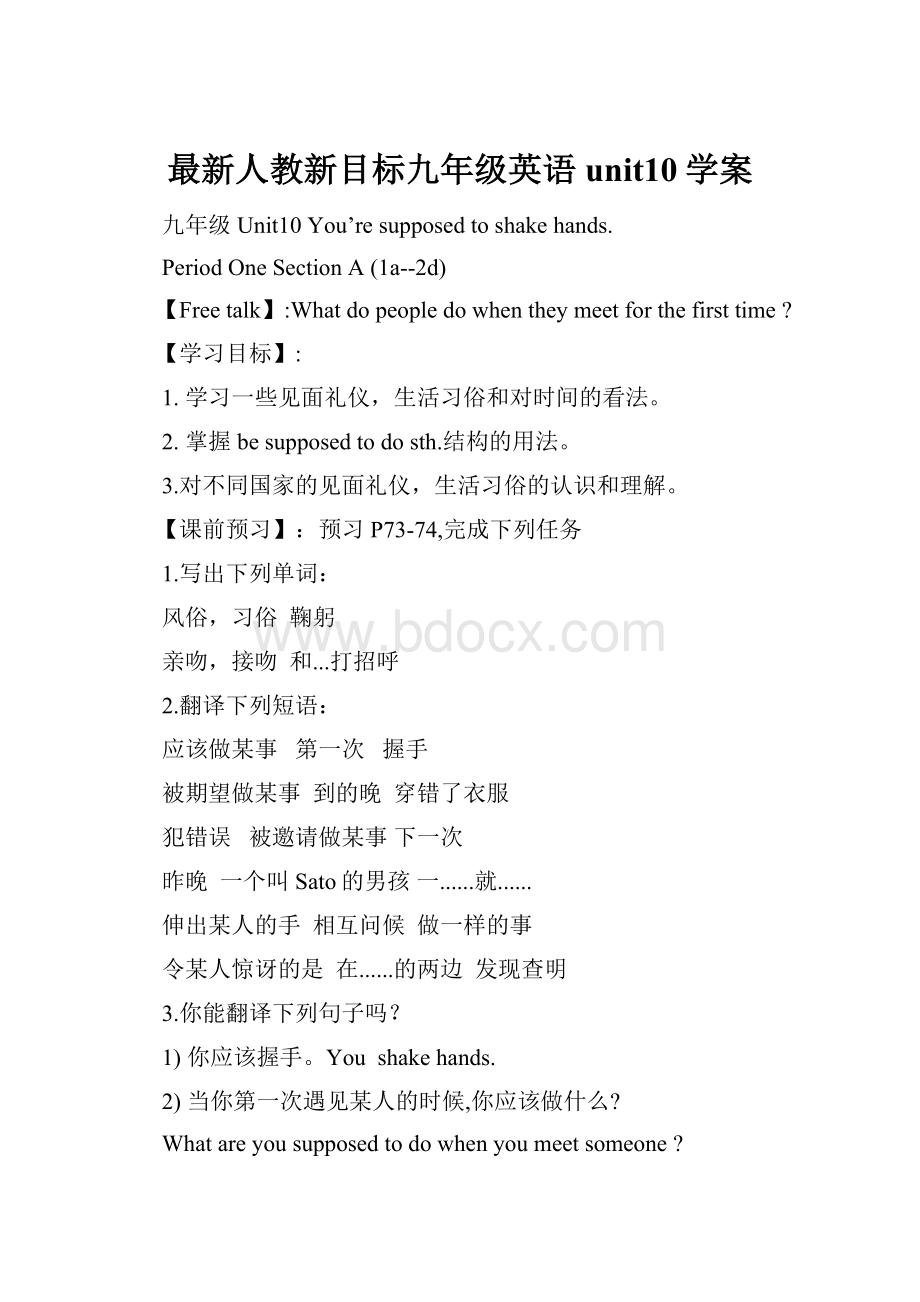最新人教新目标九年级英语unit10学案.docx
《最新人教新目标九年级英语unit10学案.docx》由会员分享,可在线阅读,更多相关《最新人教新目标九年级英语unit10学案.docx(25页珍藏版)》请在冰豆网上搜索。

最新人教新目标九年级英语unit10学案
九年级Unit10You’resupposedtoshakehands.
PeriodOneSectionA(1a--2d)
【Freetalk】:
Whatdopeopledowhentheymeetforthefirsttime?
【学习目标】:
1.学习一些见面礼仪,生活习俗和对时间的看法。
2.掌握besupposedtodosth.结构的用法。
3.对不同国家的见面礼仪,生活习俗的认识和理解。
【课前预习】:
预习P73-74,完成下列任务
1.写出下列单词:
风俗,习俗鞠躬
亲吻,接吻和...打招呼
2.翻译下列短语:
应该做某事第一次握手
被期望做某事到的晚穿错了衣服
犯错误被邀请做某事下一次
昨晚一个叫Sato的男孩一......就......
伸出某人的手相互问候做一样的事
令某人惊讶的是在......的两边发现查明
3.你能翻译下列句子吗?
1)你应该握手。
Youshakehands.
2)当你第一次遇见某人的时候,你应该做什么?
Whatareyousupposedtodowhenyoumeetsomeone?
3)让别人一直等着是不礼貌的吗?
Isittokeepothers?
4)ImetaJapaneseboycalledSatoandassoonasIheldoutmyhand,
hebowed.
5)Tomysurprised,shekissedmeonbothsidesofmyface!
【课中学习】
一预习检测(完成1a)
二自主学习Grammer(语法)
㈠be(not)supposedto+v.原形被(不被)期望/(不)应该做某事;理应。
用来表示根据规定,人们不得不做的事或期待发生的事。
时态,人称和句式的变化在be动词上体现。
to为不定式符号,后接动词原形。
eg:
肯定句:
主语+besupposedto+v.
Wearesupposedtostudyhard.我们应该努力学习。
否定句:
主语+benotsupposedto+v.
Sheisnotsupposedtosmoke.我们不应该抽烟。
一般疑问句:
Be+主语+supposedto+v.?
Areyousupposedtostudyhard?
你不应该努力学习吗?
特殊疑问句:
特殊疑问词+be主语+supposedto+v.?
Whatareyousupposedtodowhenyoumeetsomeone?
当你遇见某人时,你应该做什么?
【拓展】
①Suppose动词,“料想,猜想”表示以试探的方法提出建议或意见,使之被人接受。
eg:
Isupposehewillagree.我想他会同意。
②Doyousuppose…?
常用在口语中,其答语肯定回答为Isupposeso.否定回答为Idon’tsupposeso.或Isupposenot.
eg:
Doyousupposethatwe’llgoforawalkaftersupper?
Isupposenot.It’sgoingtorain.你猜想晚饭后我们去散步吗?
我想不会,天快下雨了。
③suppose后面可跟宾语从句,意为“假如,假使”
eg:
Supposeitrainstomorrow,whatshallwedo?
假如明天下雨,我们怎么办?
㈡shake(shookshaken)作及物动词,“摇动”,作不及物动词时意为“发抖、颤抖”。
eg:
Don’tshakethetree.别摇树。
Heshookwithcold.他冷得发抖。
【拓展】①Shakeheads摇头
②Shakehandswithsb与某人握手
③Shakesbbytheshoulder摇某人的肩膀
㈢bow可用作不及物动词,“鞠躬”。
也可用作及物动词“垂头、压弯”。
eg:
Theboybowedpolitelytohisteacher.
那男孩很有礼貌地向老师鞠躬。
Thestudentbowedhishead.这个学生垂下了头。
Thebranches(树枝)wereboweddownbythesnow.树枝被雪压弯了。
㈣greet动词,“打招呼”还有“欢迎、迎接”之意
eg:
Myfriendsgreeteduswithasmile.
我的朋友微笑着跟我们打招呼。
I’mgoingtotheairporttogreetMr.Smith.
今天上午我将去机场迎接史密斯先生。
㈤invite动词,“邀请”,
常用结构invitesbtoaplace“邀请某人去某处”
invitesbtodosth“邀请某人做某事”还有“招引、吸引”的意思。
eg:
Let’sinvitehimtoourhome.
让我们邀请他来我们家。
Theteacherinvitedmetogiveatalk.
老师邀请我发言。
Theflowersinvitedmanybees.
这些花吸引了许多蜜蜂.
㈥instead,insteadof
instead为副词,意为“代替,取代”,可单独使用,放在句首或句尾。
eg:
LastsummerIwenttoQingdao.Thissummer
I’mgoingtoDalianinstead.去年夏天我去了青岛。
而今年夏天我打算去大连。
Insteadof为介词短语,意为“代替,而不是”,后面接与前面并列成分相应的各种词或词组。
eg:
Hewenttherebytraininsteadofbyplane.
他是乘火车而不是乘飞机去那儿。
㈦Shouldhavedone(过去分词)表示“过去本应该做某事,但没有做”,这是虚拟语气的一种表达方式。
eg:
Youshouldhavetoldherthenewsearlier.
你本应该早点把消息告诉她。
三.合作探究,质疑解惑:
1.You’resupposedtoshakehands.你应该握手。
(1)besupposedtodo.应该,被期望做……
如:
Ishesupposedtocleantheoutsideofthewindoworonlytheinside?
他应该把窗户外面擦干净,还是只擦里面就可以呢?
(2)suppose动词 认定,假定如:
Letussupposethatthenewsistrue.
让我们假定这消息是真实的。
2.Youshouldhaveaskedwhatyouweresupposedtowear.
你应该早问一下该穿什么。
★shouldhavedone…这是虚拟语气的一种表达方式,虚拟语气表示所说的话只是一种主观的愿望、假象、建议等。
如:
Itisstrangethatsheshouldhavedoneit.
真奇怪,她竟干出这种事来。
四.当堂检测
(一)精挑细选
()1.Jimstoodupandshookhands_bothofthem.
A.byB.withC.forD.to
()2.Chineseneverbowed_________theenemies.
A.inB.toC.onD.with
()3.John____Beijingthedaybeforeyesterday.
A.arrivedatB.arrived
C.reachedtoD.arrivedin
()4.You__standinlinewhenwaitingforthebus.
A.mustn’tB.can’tC.aresupposedtoD.don’t
()5.She___some___inhercompetitionyesterday.
A.hasmade;mistakesB.made;mistakes
C.hadmade;mistakeD.wasmistaking;mistakes
()6.PeopleinChina________whentheymeetforthefirsttime.
A.bowB.kissC.shakehandsD.laugh
()7.Tokeepsafe,driversaren’tsupposedtodrinkbeforedriving.
A.Aren’twillingtoB.Shouldn’t
C.Aren’tsuretoD.don’thaveto
()8.—Ithinkyoushould___yourhomework,right?
—Sorry,sir.Ihaven’t.
A.finishB.finishedC.finishingD.havefinished
()9.Ifyouarrive_______late,Idon’tmind.
A.littleB.abitofC.alittlebitofD.abit
()10.Whatshouldyoudowhenyoumeetsomeonethefirsttime
inEngland?
A.forB.inC.atD.with
(2)翻译官
风俗,习俗鞠躬
亲吻,接吻和...打招呼
翻译下列短语:
应该做某事第一次握手
被期望做某事到的晚穿错了衣服
犯错误被邀请做某事下一次
昨晚一......就......
伸出某人的手相互问候做一样的事
令某人惊讶的是在......的两边发现查明
【课后巩固】
1.根据首字母或汉语提示写出单词。
1IntheUnitedStates,they’reetoshakehands.
2.InJapan,it’simpoliteifyoudon’tb.
3.Imyhand.(伸出)
4.Tomysurprise,shekmeonbothsidesofmyface!
5.Later,IFrenchpeoplearesupposedtokisswhentheyseeeachother.
二英汉互译.
1.你应该握手。
2.在你们国家,当你第一次遇见某人时你应该做什么?
3.Iheldoutmyhandandtomysurprise,shekissedmeonbothsidesofmyface!
4.LaterIfountoutFrenchpeoplearesupposedtokisswhentheyseeeachother.
【学习评价】:
Excellent/Good/Notbad
自我评价:
小组评价:
九年级Unit10You’resupposedtoshakehands.
PeriodTwoSectionA(3a--4c)
【Freetalk】:
Howmuchdoyouknowabouttablemannersaroundtheworld?
【学习目标】:
1.掌握“be(not)supposedto”的结构及用法。
2.熟悉不同国家的礼仪风俗。
3.了解世界各国文化,在生活中做个有心人,有礼有节之人。
【课前预习】:
预习P74-P75,完成下列任务
1.写出下列单词:
重视________首都________正午________疯的________
努力________护照________粉笔________黑板________
北方的________海岸季节敲,击
东方的值得方式,礼貌-
2.翻译下列短语:
顺便访问________毕竟,终归________大动肝火________
作出努力________把......擦掉________脱下________
对......相当宽松的________晚一点________在我们的日常生活中________
制定计划做......准时邀请某人干某事
......的省会生气使别人一直等着
3.你能翻译下列句子吗?
A.我来自的那个地方,对时间是相当宽松的。
.
B.Weliketoenjoyourtimeslowly.
C.Weoftenjustdropbyourfriends’homesifwehavetime.
D.在瑞士,准时是非常重要的.
E.毕竟,我们是钟表王国.
F.我们不先打招呼绝对不能拜访一个朋友的家.
G.Weusuallyplantodosomethinginteresting,orgosomewheretogether.
【课中学习】
1、预习检测(完成3b)
二、自主学习
1.WhereI’mfrom,we’reprettyrelaxedabouttime.
我所在的地方,对时间是相当宽松的。
(1)WhereI’mfrom.Where是副词,此处用法没有先行词,“在,于,或至……的地方”。
例:
Wherethere’snorain,farmingisdifficultorimpossible.
在不下雨的地方,农业是困难的或根本不可能的。
(2)where经常引导以place为先行词的定语从句。
如:
Shewouldliketoliveinacountrywhereitneversnows.
她喜欢住在不下雪的国家。
(3)pretty 副词 相当地,颇如:
Hedidprettywell. 他做的相当好。
(4)relaxed形容词 松弛的,缓和的,松懈的,通常用来修饰人。
如:
He’sfeelingrelaxednow.他现在感觉轻松多了。
relaxing则往往修饰物。
如:
Readingisrelaxing. 读书让人放松.
2.Weoftenjustwalkaroundthetowncenter,seeingasmanyasofourfriendsaswecan.我们经常走遍市中心,看尽可能多的朋友。
as…as…用于平等的比较,中间用形容词、副词的原级。
如:
Pleasecomehereasquicklyaspossible. 请尽可能快点过来。
当as…as…用于否定句中时,则习惯用so…as…
如:
Itisn’tsobigasyouthinkitis. 它并没有你所想象的那么大。
3.InSwitzerland,it’sveryimportanttobeontime.在瑞士,准时是很重要的。
it用作形式主语,代替了真正的主语tobe…这一不定式,不定式可以做主语,但是又往往用it作形式主语来代替。
如:
Toinventnewthingsishisjob.=It’shisjobtoinventnewthings.
发明新东西是他的工作。
Tohelpothersisgoodwhentheyareintrouble.
=It’sgoodtohelpotherswhentheyareintrouble.
帮助那些处于麻烦当中的人是好事。
4.Wealmostalwaysmakeplanstoseefriends.
我们几乎都是做好去看朋友的计划。
makeplansfortheholidays作好度假计划。
plan在此短语中为名词,另外,plan还可以作为动词来用。
如:
plantodosth. 计划做某事。
WeareplanningtovisitEuropethissummer.
我们正计划今年夏天去欧洲旅行。
5.Weusuallyplantodosomethinginteresting,orgosomewheretogether.
我们通常计划好做些有趣的事,或一起去某个地方。
Somethinginteresting,something是不定代词,其修饰语要放后面。
三.合作探究,质疑解惑:
1.as…as…用于平等的比较,中间用形容词、副词的原级。
如:
Pleasecomehereasquicklyaspossible.请尽可能快点过来。
当as…as…用于否定句中时,则习惯用so…as…
如:
Itisn’tsobigasyouthinkitis.它并没有你所想象的那么大。
2.relaxed形容词 松弛的,缓和的,松懈的,通常用来修饰人。
3. 如:
He’sfeelingrelaxednow. 他现在感觉轻松多了。
relaxing则往往修饰物。
如:
Readingisrelaxing. 读书让人放松。
四、当堂检测:
(一)精挑细选
1.When___yousupposedto____themeetingyesterday?
A.were,had B.was,had
C.were,have D.was,have
2.Weoften_______ourfriends’homeswithout_______themfirst.
A.dropby,call B.dropby,calling
C.visit,call D.visits,calling
3.It’s_______topointatotherswithyourchopsticks.
A.polite B.rude C.correct D.good
4.InBrazilpeopleshould___theirmouths___theirnapkineverytime
theytakeadrink.
A.wipe,toB.wipe,with
C.sweep,to D.sweep,with
5.Theboxis______heavy______Ican’tliftit.
A.too,to B.so,that C.very,that D.too,that
6.Jimhasmademanyfriendssincehe___toChina.
A.came B.comes C.hascomeD.willcome
7.Hegaveup_____twoyearsago.That’stosay,heisanon-smokernow.
A.SmokeB.smokingC.tosmokeD.smoked
8.ShehadneverbeentotheGreatWallbefore.
Todayshesawit________thefirsttime.
A.at B.for C.in D.by
9.Pauldoesn’thavetobemade________.Healwaysworkshard.
A.learn B.tolearn C.learning D.learned
10.Doyouneed________toreadonthetrain?
A.specialanything B.anyspecialthing
C.anythingspecially D.anythingspecial
(二)翻译官
顺便访问________毕竟,终归________大动肝火________
作出努力________把......擦掉________脱下________
对......相当宽松的________晚一点________在我们的日常生活中________
【课后巩固】
1、根据句意及词首字母写出单词。
1.InJapan,thepeoplearesupposedto(鞠躬)whentheymeetforthetime.
2.It'snotpolite(亲吻)theothersinpublicinChina.
3.Iwassupposedtoarriveat8:
00,butI(到达)at9:
00.
4.WhenwemeetAmericansforthefirsttime,weshould(握手)withthem.
5.Youmustknowsome(习俗)beforeyougotosomeforeigncountries.
二、单项选择
()1.Jimstoodupandshookhands____________bothofthem.
A.byB.withC.forD.to
()2.Chineseneverbowed____________theene